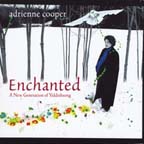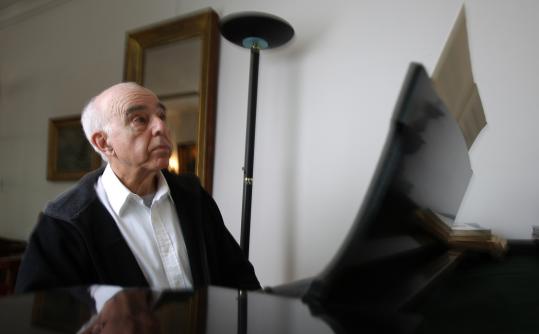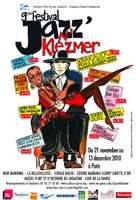« October 2010 | Main | December 2010 »
November 28, 2010
November 26, 2010
Robinson reviews new Adrienne Cooper "Enchanted" - Hanukah must have recording
 Starting to worry about what you might want to hand out this Hanukah? Well, the obvious answer is the new CD by Adrienne Cooper, Enchanted. George Robinson tells us more in this review in the Jewish Week:
Starting to worry about what you might want to hand out this Hanukah? Well, the obvious answer is the new CD by Adrienne Cooper, Enchanted. George Robinson tells us more in this review in the Jewish Week:
New Musical Life For A Supposedly Dead Language, Thursday, November 4, 2010, George Robinson, The Jewish Week
You've already read my thoughts about referring to Yiddish with the tedious phrase, "supposedly dead language" in a post earlier this evening, but George and I are in significant agreement—this is the real deal, and an amazing recording. I'd go into more detail, but it's his turn.
Weimar Winter Workshops announced, Jan 23 - Feb 9, 2011
NY Times celebrate KlezKamp
I am very, very tired of the "last gasp of a dying culture" articles about Yiddish and Yiddish culture. The Yiddish culture of a century ago is long gone. The Yiddish culture of modern haredi Jews is quite well, if not remotely relevant to those who celebrate this new, ongoing "Yiddishland," (taking the term from the excellent Adventures in Yiddishland (2008) by Jeffrey Shandler). In short, KlezKamp represents neither a dying culture, nor its most dominant current form. It does provide wonderful access to a culture that was, and to a wonderful, very alive current culture in which "Yiddishkeit" is a significant component. Anyway, that's my take. Here's what the NY Times has to say. You can find out for yourself, of course, next month, at KlezKamp. Why rely on the NY Times when it is so easy and rewarding to find out for yourself?
No Need to Kvetch, Yiddish Lives On in Catskills, David Goldman for The New York Times, November 25, 2010
KERHONKSON, N.Y.—In a chilled and snow-shrouded Catskills landscape, hundreds of people get together every December to try to breathe some warmth into a dying culture. … [more]
November 15, 2010
Hebrew College presents evening with Yehudi Wyner
 If I had the time, I would wax lyrical about a special evening sponsored by Hebrew College's School of Jewish Music (SJM) this past Saturday night. Instead, I will try to honor Yehudi and Hebrew College, and perhaps whet people's appetite for more.
If I had the time, I would wax lyrical about a special evening sponsored by Hebrew College's School of Jewish Music (SJM) this past Saturday night. Instead, I will try to honor Yehudi and Hebrew College, and perhaps whet people's appetite for more.
The event featured Professor Wyner presenting a series of art song featuring music by his father, Lazar Weiner (father and son spell their family name differently. Insert obligatory immigrant joke here). Wyner introduced many of the songs, and featured singing by a range of luminaries starting with both the President of Hebrew College (Daniel Lehmann) and head of the SJM (Cantor Dr. Brian J. Mayer) and including Cantor Louise Treitman and HC student Rick Lawrence. In addition, we got to listen to several songs by Lynn Torgove, who was also featured in a recent performance (Nov 5, 2010) of Yehudi's own pieces, performed by the Cantata Singers, at Jordan Hall. The voices were magnificent.
The thing is, Yehudi Wyner also helped us hear with his father's ears. As a typographer, for the first time I made that connection between art song—composing music that enables the ears to hear and appreciate the poet's words—and typographer, the art of printing a poet's words so that the words are noticed. In both cases, the communicative medium, whether it be music or print, is most successful when the medium is missed, but the words, the poet's intent, are heard.

It is almost criminal that pieces this good are heard so seldom, and I feel very fortunate to have been present to hear Yehudi's stories, along with the exquisite performances. This was not a random event. The SJM is seeking a higher profile, and I would presume would be very happy to talk with sponsors and donors who can further its programs. Starting just a few years ago, there are now 31 students and 10 graduates. All of the graduates, according to Acting Dean Mayer, found immediate employment. That, too, is a neat statement in these times. Stay tuned for a symposium on Yiddish Art Song later in 2011 which will feature scholars such as Mayer, Josh Jacobson, Hankus Netsky, and other members of a very rich Jewish music community here in Boston.
If you are interested in knowing more about the music of Weiner (and Wyner!), or the SJM, check out their website, www.hebrewcollege.edu/jewish-music-cantor. You should also contact them to get on the mailing list for the forthcoming symposium.
